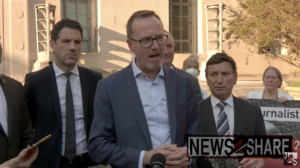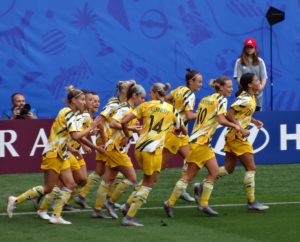Liberals’ Lesson Down Under
Kevin Rudd, Australia's new prime minister, combines iron discipline with a puckish sense of humor, political toughness with a reflective spiritual side, and a youthful disposition with an old pro's skill at divining where a majority lies.WASHINGTON — Kevin Rudd, Australia’s new prime minister, combines iron discipline with a puckish sense of humor, political toughness with a reflective spiritual side, and a youthful disposition with an old pro’s skill at divining where a majority lies.
The triumph of Rudd and his Australian Labor Party holds lessons for Democrats and other center-left parties. John Howard, the conservative incumbent swept from power after 11 years in office, had presided over record prosperity. For the first time in the country’s history, wrote Peter Hartcher in the Sydney Morning Herald, a government was tossed out in unambiguously strong economic times.
Until Saturday’s vote, Labor had lost four elections in a row. One young Labor politician I spoke with during a visit to Australia this summer worried whether her party would have any future if it lost a fifth time. As it happens, Labor under Rudd won its largest share of the vote in 60 years. Howard lost his own seat in a rout that saw Labor go from 60 seats to about 86 seats (some races are still close) in the 150-member House of Representatives.
Rudd built on a strong reaction against Howard’s new workplace laws curtailing the rights of workers and unions. Labor won a swath of seats in the far suburbs of the big metropolitan areas where younger two-income families flourish but also struggle with rising mortgage rates and the work-family-community time crunch.
But it is the success of the 50-year-old Rudd in drawing a generational line across the Australian electorate that could be adopted elsewhere, particularly in countries like ours where young people are frustrated with replays of old battles. He overwhelmed the 68-year-old Howard among voters under 30, beat him among those aged 30 to 50, and ran even or slightly behind among voters over 50.
Everything Rudd did cast the election as a choice between the past and the future, the old and the new, the tired and the fresh, all embodied in his core slogans, “New Leadership” and “Fresh Ideas.” The issues he emphasized — the need for action against global warming, an “education revolution” to make Australia “the best educated country in the world,” and a pledge to bring broadband technology to the entire nation — reinforced his resolutely up-to-date aura.
Environmentalism mattered in this election. Howard suffered from his close alignment with the Bush administration on global warming, and Australia’s Green Party, with 7.6 percent of the vote, played a role in Labor’s victory.
Under Australia’s election system, voters rank candidates in order of preference. If no candidate gets a majority on the basis of first preferences, the winner is determined by redistributing ballots cast for minor parties on the basis of second preferences. Green ballots went heavily to Labor.
Rudd’s balancing act provides a model for center-left parties that also points to the tensions they confront once in power. Rudd won as a self-described “economic conservative” who would tightly manage the nation’s budget. But he also won thanks to an activated trade union movement fighting for its life in seeking to overthrow Howard’s workplace rules.
While Rudd’s centrism wooed swing voters, new political energies were unleashed through innovative organizing efforts on the left. The unions’ “Your Rights at Work” campaign mobilized especially the middle- and working-class neighborhoods where Howard had done well in the past. A Web-based group called “Get Up!” organized young progressives.
The efforts paid off. Kristina Keneally, a minister in the Labor state government in New South Wales, said that in Howard’s own district of Bennelong, “some polling places had over 50 volunteers between Labor, Get Up! and Your Rights at Work.” Rudd has to keep his core promises to the unions and his pledges of economic sobriety to middle-of-the-road voters — and not disappoint either.
I saw Rudd this summer as his media maestros were beginning to push the party’s leader-focused “Kevin07” campaign. Rudd was characteristically self-deprecating and a bit abashed about the narcissism of it all. But he knew exactly what he was doing. With the opposition in tatters and his own party grateful for victory, Rudd has earned great personal authority at the end of a very personal campaign.
One other thing: Rudd is resolutely pro-American, but he will also be able to speak to China’s leaders in fluent Mandarin. You wonder if that’s about the future too.
Rudd relied on youth, moderation and the voters’ exhaustion with the ideological categories of the past. But he also needed the passion of activists determined to end a long conservative era. Sound familiar?
E.J. Dionne’s e-mail address is postchat(at)aol.com.
© 2007, Washington Post Writers Group
Your support matters…Independent journalism is under threat and overshadowed by heavily funded mainstream media.
You can help level the playing field. Become a member.
Your tax-deductible contribution keeps us digging beneath the headlines to give you thought-provoking, investigative reporting and analysis that unearths what's really happening- without compromise.
Give today to support our courageous, independent journalists.






You need to be a supporter to comment.
There are currently no responses to this article.
Be the first to respond.